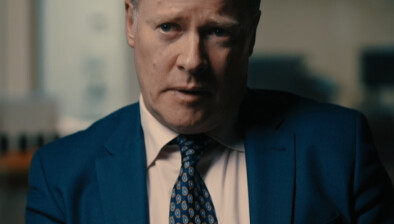NI High Court: Paddy Jackson’s father awarded £100,000 damages over ‘cowardly online bile’

The Master of Northern Ireland’s High Court has assessed damages for defamation at £100,000 in favour of Peter Jackson, father of Paddy Jackson.
Delivering judgment for the High Court, Master Mark Harvey highlighted: “The lesson for the defendant in this case, and frankly for those posting on social media platforms generally, is that virtual comments have real life consequences. There seems to be a sense in some quarters that there is an online cloak of invisibility leading people to type things on a keyboard they may never utter in person. Such cowardly online bile causes real life hurt and upset to other people and damages their reputation.”
Mr Lyttle KC and Mr Bassett appeared for the plaintiff, instructed by KRW Law Solicitors.
Background
In 2018, the plaintiff’s son and a fellow rugby teammate were found not guilty of serious offences including rape.
Shortly after the conclusion of the trial, between 13 and 16 April 2018, the defendant wrote a series of 19 posts on Twitter under the name @DanielleTVGold alleging inter alia that the plaintiff interfered with witnesses by “paying off” defence witnesses and the complainant.
The defendant deleted her account in May 2018, the posts having been visible for six weeks online.
The plaintiff issued proceedings claiming damages for libel for words published by the defendant of and concerning the plaintiff on 15 and 16 April 2018, and seeking aggravated damages.
Judgment was obtained in default of the defendant’s appearance and a default judgment issued on 14 February 2020. In circumstances where there was a lack of engagement on part of the defendant, the plaintiff applied to have damages assessed pursuant to Order 37 of the Rules of Court of Judicature (Northern Ireland) 1980.
The defendant engaged a solicitor who applied to have the default judgment set aside in January 2021, claiming irregularities in the service of the writ.
Thereafter, the defendant’s solicitor came off record and the defendant failed to engage with the proceedings, with the result that her motion was struck out and the court proceeded to hear the application for the assessment of damages.
The High Court
Master Harvey set out the applicable legal principles in relation to the assessment of damages and heard the evidence of the parties, in which the plaintiff claimed inter alia that the upset resulting from the tweets had disrupted his sleep and caused him to embark on comfort eating, and that he had been diagnosed with diabetes in recent years.
Turning to the assessment of damages, the Master firstly considered the objective features of the libel itself, finding that there was no question that the defendant’s allegations were false and that “it was an outrageously bad libel” which was repeated by the defendant and which created the false impression for anyone outside the jurisdiction that in Northern Ireland it was “common knowledge” that the plaintiff had committed the alleged criminal acts.
Noting that the defendant was not someone of the same standing as the defendants in Thomas Elliot v Philip Flanagan [2016] NIQB 8 and Arlene Foster v Christian Jessen [2021] NIQB 56, the Master determined that it was less likely that Twitter users believed the accusations to be true on the basis that the defendant was someone “in a responsible position who would only have made such a statement if it was well founded”.
As to prominence, the court found that it was impossible to precisely determine the number of people to whom the defamatory statements were published, but having regard to the expert evidence which suggested that the actual visibility in this case was between 385–770 direct follower views, with “1000–3,500+ views” being possible in light of the high-profile nature of the plaintiff’s son’s trial, the court determined that the circulation of the defamatory statements was “not highly prominent”.
In this regard, the court further noted that users of online social media platforms operate in “echo chambers” and that there was no evidence of wider media coverage in relation to the tweets.
As to the subjective effect of the tweets on the plaintiff, the Master found that it was clear that the accusations hurt the plaintiff deeply and called into question his honesty and integrity, and “impacted on his sleep, his marriage, his diet, his health and the spectre of this case has hung over him for years now. He said it got into his ‘head and his heart’ and cut him deeply.”
Turning to the treatment of the plaintiff by others in the aftermath of the publications, the Master determined that he could not ignore the impact of the criminal trial in the public eye and could not reasonably conclude that all of the issues the plaintiff described were entirely attributable to the offending tweets.
In that regard, the Master considered:
“Nevertheless, his paranoia, feelings of social isolation, avoidance behaviour and in particular his obsessive internet trawling, all to varying degrees, stem from his reaction to the offending tweets. The plaintiff is not a high-profile politician who is accustomed to being discussed in public and scrutinised in the media, meaning the impact of his perception that people were talking about him negatively was more significant for him.”
The Master determined that there were significant aggravating factors in the case with no mitigation on part of the defendant, instead “there has only been aggravation, evasion and doubling down on the allegations by the defendant, with unconvincing averments in her affidavits regarding purported issues with service of the writ and that she was not responsible for publishing the tweets in question”.
The court also highlighted that the defendant never offered an apology or retraction or sought to acknowledge the falseness of the assertions regarding the plaintiff, and that the plaintiff had to live with the serious defamation for over seven years and could not say to others that he brought a case to court and obtained judgment, the defendant having “obstructed the process at every turn”.
Conclusion
Taking into account conventional personal injury awards in Northern Ireland for physical and psychiatric injury and the guidance contained in the 6th edition of the Green Book (2024), Master Harvey assessed damages in the sum of £100,000 and awarded costs to the plaintiff.
Peter Jackson v Danielle Collins [2025] NI Master 16









